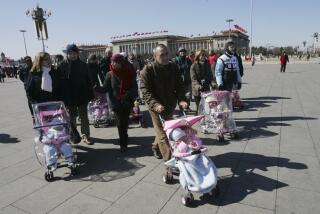Spain’s would-be parents turn to China to adopt
- Share via
MADRID — Milagros Vacas Arlandis had three children and a demanding job as a doctor. Still, she and her husband felt something was missing: They decided to adopt a child.
For the next 10 years, they contended with Spain’s tough bureaucratic hurdles to adoption, without success. So they turned to China -- and are now the parents of a 4-year-old girl they named Maria.
As once-homogenous Spain digests a newly diverse population, enriched by an influx of about 4 million immigrants over the last decade, it also has one of the world’s highest per capita international adoption rates. More than half of the adopted children come from China.
“My husband and I always wanted to provide a home for a child who didn’t have a family,” said Vacas Arlandis, who lives in the northern city of Santander. “We tried to adopt in Spain, but after waiting for years and hearing nothing, we decided to take a different route.”
After the U.S., Spain is the country that adopts the most children from China, the China Center of Adoption Affairs reported. In 2005, Spanish families adopted more than 5,400 children from abroad, up from 1,800 in 1997. More than 2,700 of the 2005 adoptions were from China, Spanish government data show.
In contrast, the U.S. -- a country whose population of 300 million is more than seven times greater than Spain’s 40 million -- recorded just over 7,900 adoptions from China in 2005, the State Department said.
Greater female participation in the workforce and rising divorce rates have led many Spaniards to start families later, said Juan Jose Garcia Ferrer, director of the Institute for Children and Family, a branch of Madrid’s regional government.
“As women become more involved in their careers, they are putting off motherhood,” Garcia Ferrer said. “And with 30 being the median age for a first marriage and half of all marriages ending in divorce, the demand for adoptions” will grow.
At the same time, rapid economic development over the last decade has given many families better access to technology as well as the financial means to pay for adoption fees and international travel, he said.
China is the country of choice for most Spanish families looking to adopt, thanks to brief waits, a relatively transparent legal process and a high availability of children -- mostly girls -- under age 3, said Roberto Pili, director of Transmes, a Barcelona-based agency that files paperwork for families seeking to adopt Chinese children.
Much of the problem in Spain is that it is very complicated to adopt a child whose parents are still alive -- the consent of the biological parents is required and they are often difficult to locate. Abandoned kids often spend years in state care and are thus older and less appealing to couples who want to start a family or add to an existing one.
But in China “the process is secure, the children are very young and the medical information about the children is accurate,” said Pili, who has three adopted Chinese daughters.
China’s one-child population-control policy has combined with its cultural bias toward boys over girls to create a situation where the country “simply has a very large number of adoptable female children,” Pili added.
But with the growing international demand for adoptions now exceeding the number of available children, China is tightening its regulations to favor healthy, economically prosperous, middle-aged couples.
Celsa Vega, a 50-year-old single Madrid woman whose adopted daughter, Julia, is now 6, said she felt lucky to have adopted from China before the new rules made it next to impossible for single parents to do so.
Vega, a civil servant, spent her youth traveling, studying and working various jobs. But still single and in her mid-40s, she decided to make her dream of becoming a mother a reality by adopting a Chinese baby.
“I waited a long time and always felt like I had many years ahead of me,” Vega said. “But at a certain point I decided that I had reached the age where I had to make a decision: Either I become a mother or I don’t.”
In 2002 -- after waiting less than two years -- she traveled to China to pick up Julia.
Experts on cross-cultural adoptions warn that Chinese-born children raised in Spanish families may struggle with issues of race and identity as they age.
But Vacas Arlandis says the experience has been overwhelmingly positive.
“People say you did her a big favor, but she’s the one who did us the favor,” she said.
More to Read
Sign up for Essential California
The most important California stories and recommendations in your inbox every morning.
You may occasionally receive promotional content from the Los Angeles Times.













